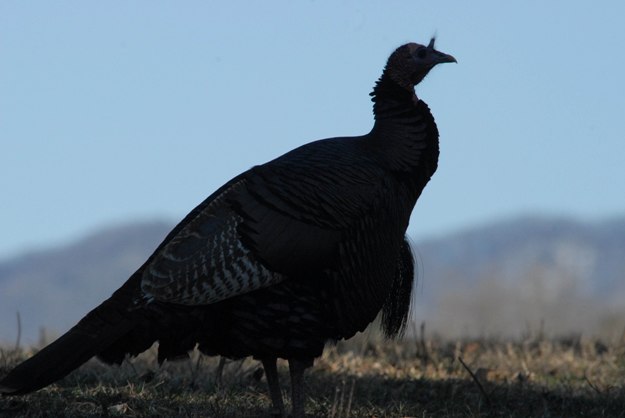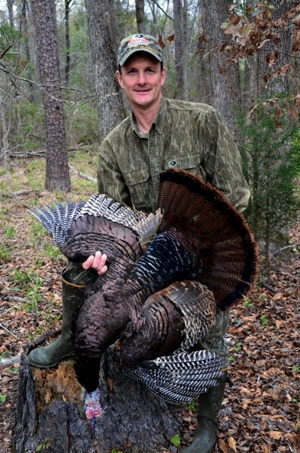
You can get your feelings hurt by toms at the beginning of turkey season. Let’s say you hear a turkey gobbling its brains out from the roost, then when you’re within calling distance to that bird, he’ll shut up. Even if you’re a world-champion turkey caller, you won’t able to make that turkey gobble again. I wish I had a dollar for every time that’s happened to me when I’ve been guiding another hunter. I know what the hunter’s thinking, “Bob Walker is supposed to know how to call turkeys. We’ve found a good gobbling bird. But Bob can’t call him in, so I hope the rest of the morning won’t be like this.”
If we don’t get on another gobbling bird, I know what I’ll have to do the next morning to take that hushed-mouth gobbler. I’ll have to leave the lodge at least 1-2 hours earlier than we’ve left the day before. All the way to where we’re parking and leaving the truck, I’ll talk to my hunter about being quiet and walking silently through the woods. We’ll walk much slower and be more careful about where we put our feet than the day before, because I want us to get as close as we possibly can to that gobbler roosted in the tree without spooking him.
 I like to get within 100-120 yards of a turkey. But the terrain and the foliage will determine how close we can get. In the early season, there won’t be much foliage on the trees and bushes, so I may not be able to get that close without spooking the bird. Getting that close to a turkey in the early season takes being extremely quiet to try and get to the turkey before daylight. When we reach the place where we’ll take a stand, I instruct my hunter how to sit down as quietly as possible. We’ll sit still, let the woods wake up and wait on the turkey to gobble. When the bird gobbles, if I believe we can move without spooking the gobbler, we’ll move closer. Then we’ll sit back down and see what the gobbler does. If I can gain an extra 20 or 30 yards and get closer to the gobbler by getting in a creek bed that completely will hide our movements and help muffle the sound of our walking, I’ll try to gain that extra 20 to 30 yards on that gobbler. If he’s on the other side of a hill from us and can’t see or hear us, we’ll try and close the distance quietly. If we get that extra 20 to 30 yards by crawling in a creek bed, then we’ll set-up beside a tree, prepare to call and then make the shot.
I like to get within 100-120 yards of a turkey. But the terrain and the foliage will determine how close we can get. In the early season, there won’t be much foliage on the trees and bushes, so I may not be able to get that close without spooking the bird. Getting that close to a turkey in the early season takes being extremely quiet to try and get to the turkey before daylight. When we reach the place where we’ll take a stand, I instruct my hunter how to sit down as quietly as possible. We’ll sit still, let the woods wake up and wait on the turkey to gobble. When the bird gobbles, if I believe we can move without spooking the gobbler, we’ll move closer. Then we’ll sit back down and see what the gobbler does. If I can gain an extra 20 or 30 yards and get closer to the gobbler by getting in a creek bed that completely will hide our movements and help muffle the sound of our walking, I’ll try to gain that extra 20 to 30 yards on that gobbler. If he’s on the other side of a hill from us and can’t see or hear us, we’ll try and close the distance quietly. If we get that extra 20 to 30 yards by crawling in a creek bed, then we’ll set-up beside a tree, prepare to call and then make the shot.
I love to hunt a creek bottom with very little water in it, or a ditch that will allow me to get close to a turkey. On this second move, to gain 20-30 yards, more than likely we’ll be crawling. When you’re attempting to get in close to a turkey, you must stay as low as possible and move slowly and quietly. Sometimes gaining that 20-30 extra yards to get closer to that gobbler may be all you need to get him to come to you, so you can squeeze the trigger on that bird. If we find this turkey in the early season, I’ll be more aggressive with my calling than I normally am during the season. I want that turkey to fly off the roost and come straight to me and my hunter before his hens fly down. If I’m successful in getting the gobbler to come to me before his hens fly down, then that’s wonderful. However, even if the gobbler doesn’t fly to me, I should be able to hear and possibly see in what direction he flew out of the tree. The information will tell me how and where to hunt him, once he’s on the ground. I also should be able to see and hear the hens fly down and fly to him.
Once the gobbler’s with the hens, I’ll start scratching in the leaves and giving soft purrs and soft yelps like a feeding hen to try and pull the hens and the gobbler to me. If I’m unsuccessful and the flock feeds away from me, I’ll wait until I know the turkeys can’t hear us move. Then we’ll back up, circle the flock, try and get in front of the flock, set-up, do some soft calling and scratching in the leaves and wait on the turkeys to come to us. When we make that move to get in front of the turkeys, I’ll explain to my hunter, “Now’s the time you need a double dose of patience because those turkeys won’t be in any hurry to get to us, so just relax and listen.”



























